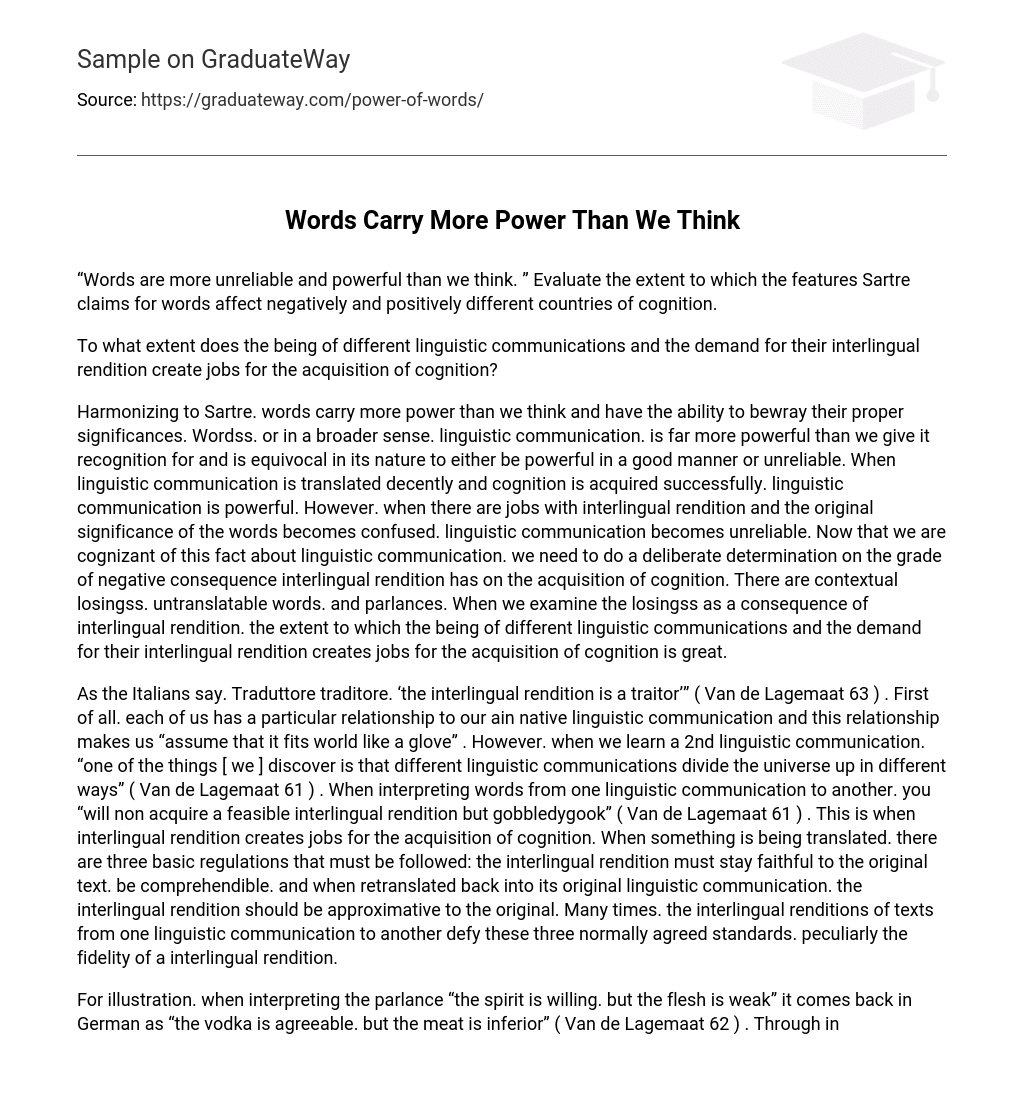“Words are more unreliable and powerful than we think. ” Evaluate the extent to which the features Sartre claims for words affect negatively and positively different countries of cognition.
To what extent does the being of different linguistic communications and the demand for their interlingual rendition create jobs for the acquisition of cognition?
Harmonizing to Sartre. words carry more power than we think and have the ability to bewray their proper significances. Wordss. or in a broader sense. linguistic communication. is far more powerful than we give it recognition for and is equivocal in its nature to either be powerful in a good manner or unreliable. When linguistic communication is translated decently and cognition is acquired successfully. linguistic communication is powerful. However. when there are jobs with interlingual rendition and the original significance of the words becomes confused. linguistic communication becomes unreliable. Now that we are cognizant of this fact about linguistic communication. we need to do a deliberate determination on the grade of negative consequence interlingual rendition has on the acquisition of cognition. There are contextual losingss. untranslatable words. and parlances. When we examine the losingss as a consequence of interlingual rendition. the extent to which the being of different linguistic communications and the demand for their interlingual rendition creates jobs for the acquisition of cognition is great.
As the Italians say. Traduttore traditore. ‘the interlingual rendition is a traitor’” ( Van de Lagemaat 63 ) . First of all. each of us has a particular relationship to our ain native linguistic communication and this relationship makes us “assume that it fits world like a glove” . However. when we learn a 2nd linguistic communication. “one of the things [ we ] discover is that different linguistic communications divide the universe up in different ways” ( Van de Lagemaat 61 ) . When interpreting words from one linguistic communication to another. you “will non acquire a feasible interlingual rendition but gobbledygook” ( Van de Lagemaat 61 ) . This is when interlingual rendition creates jobs for the acquisition of cognition. When something is being translated. there are three basic regulations that must be followed: the interlingual rendition must stay faithful to the original text. be comprehendible. and when retranslated back into its original linguistic communication. the interlingual rendition should be approximative to the original. Many times. the interlingual renditions of texts from one linguistic communication to another defy these three normally agreed standards. peculiarly the fidelity of a interlingual rendition.
For illustration. when interpreting the parlance “the spirit is willing. but the flesh is weak” it comes back in German as “the vodka is agreeable. but the meat is inferior” ( Van de Lagemaat 62 ) . Through interlingual rendition. this parlance lost its true significance. An illustration of a mistranslation is when Pepsi Cola ran an advertisement run in Taiwan. the slogan “Come Alive with Pepsi” was translated into Chinese and when translated back into English. it read “Pepsi brings your ascendants back from the dead! ” ( Van de Lagemaat 63 ) . Unsurprisingly. because of the ailment communicated significance. the run was a failure. There is besides inaccurate interlingual rendition in literature such as the mistranslation of Albert Camus widely renowned novel’s rubric The Stranger. or L’etranger. In Gallic. L’etranger does non merely average “stranger” but has a much deeper and intricate significance that caters to the novel’s expressed message.
Further grounds that non everything is translated adequately is found in the interlingual renditions of the Quran. “the cardinal spiritual text of Islam” . “Because the Qur’an stresses its Arabic nature. Muslim scholars believe that any interlingual rendition can non be more than an approximative reading. intended merely as a tool for the survey and apprehension of the original Arabic text” ( Mohammed 58 ) . Since non merely the text must be translated. but the significance and symbolism. it is believed that many things are lost in the Arabic to English reading. Whether or non the renditions of the Quran into English or other linguistic communications are accurate plenty of non is a to a great extent debated topic for bookmans. I can understand how this happens being a talker of Arabic myself. There are certain Arabic words I say in my day-today life that can non be suitably translated in English without their existent significances being lost.
The Arabic looks like “yislamleh teezik” that make small to no sense when straight translated into English. In Arabic. this normally used look is supposed to be an fond manner of stating “thank you” or “may you ever stay in my life” . The English interlingual rendition would be “may God bless your butt” . and the capturing significance it has in Arabic is wholly lost to interlingual rendition. Although interlingual rendition causes jobs for the acquisition of cognition to a great extent. it does non ever do this. When something can be translated and the significance is transferred from one linguistic communication to another without any injury coming to it. cognition is powerful.
In the kingdom of mathematics and scientific disciplines. mathematical and scientific constructs can be translated accurately from one linguistic communication to another unlike in literature. An illustration of this can be found in my math surveies schoolroom with Ms. Halabi. She told us a humourous anecdote about how she learnt math in Arabic and how that would hold been so unusual for us to see. Math is a cosmopolitan linguistic communication and is non harmed when translated from one linguistic communication to another.
In decision. the interlingual rendition of cognition between different linguistic communications can be both powerful and unreliable in nature. It is powerful when there is no loss of intending between interlingual renditions but can be unreliable when it disrupts the acquisition of cognition. This is a bad thing because as apprehenders. we don’t acquire to entree certain cognition because it can’t be translated decently.





